
Eric Steven Lander is an American mathematician and geneticist who is a professor of biology at the Massachusetts Institute of Technology (MIT), and a professor of systems biology at Harvard Medical School. Eric Lander is founding director emeritus of the Broad Institute of MIT and Harvard.
Mark Bender Gerstein is an American scientist working in bioinformatics and Data Science. As of 2009, he is co-director of the Yale Computational Biology and Bioinformatics program.
Mouse Genome Informatics (MGI) is a free, online database and bioinformatics resource hosted by The Jackson Laboratory, with funding by the National Human Genome Research Institute (NHGRI), the National Cancer Institute (NCI), and the Eunice Kennedy Shriver National Institute of Child Health and Human Development (NICHD). MGI provides access to data on the genetics, genomics and biology of the laboratory mouse to facilitate the study of human health and disease. The database integrates multiple projects, with the two largest contributions coming from the Mouse Genome Database and Mouse Gene Expression Database (GXD). As of 2018, MGI contains data curated from over 230,000 publications.

David Haussler is an American bioinformatician known for his work leading the team that assembled the first human genome sequence in the race to complete the Human Genome Project and subsequently for comparative genome analysis that deepens understanding the molecular function and evolution of the genome.
Gerald Mayer Rubin is an American biologist, notable for pioneering the use of transposable P elements in genetics, and for leading the public project to sequence the Drosophila melanogaster genome. Related to his genomics work, Rubin's lab is notable for development of genetic and genomics tools and studies of signal transduction and gene regulation. Rubin also serves as a vice president of the Howard Hughes Medical Institute and executive director of the Janelia Research Campus.

Eric D. Green is an American genomics researcher who had significant involvement in the Human Genome Project. He is the director of the National Human Genome Research Institute (NHGRI) at the National Institutes of Health (NIH), a position he has held since 2009.
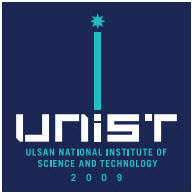
Ulsan National Institute of Science and Technology, is one of the four public universities in South Korea which are dedicated to research in science and technology, along with KAIST, GIST, UST, and DGIST. UNIST was founded in 2007 in response to growing demand for higher education in the Korean industrial capital of Ulsan, where world-renowned automotive, shipbuilding, petrochemical, and secondary cells industries are clustered. At the time of its foundation, UNIST was known for being the first national university in South Korea to be incorporated and thus administered by an independent board of trustees despite being funded by the central government.
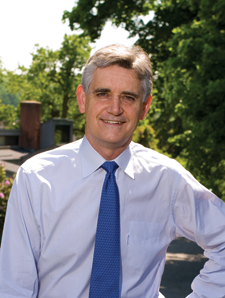
Bruce William Stillman, AO, FAA, FRS is a biochemist and cancer researcher who has served as the Director of Cold Spring Harbor Laboratory (CSHL) since 1994 and President since 2003. He also served as the Director of its NCI-designated Cancer Center for 25 years from 1992 to 2016. During his leadership, CSHL has been ranked as the No. 1 institution in molecular biology and genetics research by Thomson Reuters. Stillman's research focuses on how chromosomes are duplicated in human cells and in yeast Saccharomyces cerevisiae; the mechanisms that ensure accurate inheritance of genetic material from one generation to the next; and how missteps in this process lead to cancer. For his accomplishments, Stillman has received numerous awards, including the Alfred P. Sloan, Jr. Prize in 2004 and the 2010 Louisa Gross Horwitz Prize, both of which he shared with Thomas J. Kelly of Memorial Sloan-Kettering Cancer Center, as well as the 2019 Canada Gairdner International Award for biomedical research, which he shared with John Diffley.

Leona D. Samson is the Uncas and Helen Whitaker Professor and American Cancer Society Research Professor of Biological Engineering at the Massachusetts Institute of Technology, where she served as the Director of the Center for Environmental Health Sciences from 2001 to 2012. Before her professorship at MIT, she held a professorship at the Harvard School of Public Health. She is on the editorial board of the journal DNA Repair. Her research interests focus on "methods for measuring DNA repair capacity (DRC) in human cells", research the National Institute of Health recognized as pioneering in her field, for which the NIH granted her the National Institutes of Health Director's Pioneer Award.
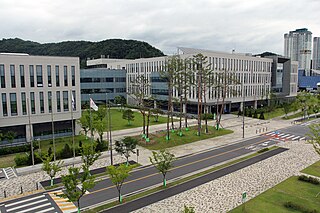
The Institute for Basic Science is a Korean government-funded research institute that conducts basic science research and relevant pure basic research. Comprising approximately 30 research centers with more than 60 research groups across the nation and a headquarters in Daejeon, IBS has approximately 1,800 researchers and doctoral course students. Around 30% of the researchers are from countries outside of South Korea. The organization is under the Ministry of Science and ICT.

Elaine Ann Ostrander is an American geneticist at the National Human Genome Research Institute (NHGRI) of the National Institutes of Health (NIH) in Bethesda, Maryland. She holds a number of professional academic appointments, currently serving as Distinguished and Senior Investigator and head of the NHGRI Section of Comparative Genomics; and Chief of the Cancer Genetics and Comparative Genomics Branch. She is known for her research on prostate cancer susceptibility in humans and for conducting genetic investigations with the Canis familiaris —the domestic dog— model, which she has used to study disease susceptibility and frequency and other aspects of natural variation across mammals. In 2007, her laboratory showed that much of the variation in body size of domestic dogs is due to sequence changes in a single gene encoding a growth-promoting protein.

Steve Granick is an American scientist and educator. In 2023 he joined the University of Massachusetts-Amherst as the Robert Barrett Endowed Chair of Polymer Science and Engineering, with joint appointment in the Chemistry, Physics, and Chemical Engineering Departments after serving as director of the Institute for Basic Science Center for Soft and Living Matter, an interdisciplinary blue-sky research center in Ulsan, South Korea that pursues basic science research. Until 2015 he was professor at the University of Illinois at Urbana-Champaign. He is a member of the American Academy of Arts and Sciences and the U.S. National Academy of Sciences.
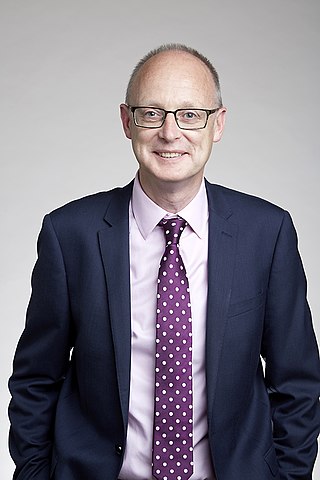
Kenneth Henry Wolfe is an Irish geneticist and professor of genomic evolution at University College Dublin (UCD), Ireland.

Orlando David Schärer is a Swiss chemist and biologist researching DNA repair, genomic integrity, and cancer biology. Schärer has taught biology, chemistry and pharmacology at various university levels on three continents. He is a distinguished professor at the Ulsan National Institute of Science and Technology (UNIST) and an associate director of the IBS Center for Genomic Integrity located in Ulsan, South Korea. He leads the three interdisciplinary research teams in the Chemical & Cancer Biology Branch of the center and specifically heads the Cancer Therapeutics Mechanisms Section.

Anton Gartner is a geneticist and biologist utilizing the nematode worm Caenorhabditis elegans as a model system He is a distinguished professor at the Ulsan National Institute of Science and Technology (UNIST) in Korea and is one of the two associate directors of the IBS Center for Genomic Integrity located on the UNIST campus.
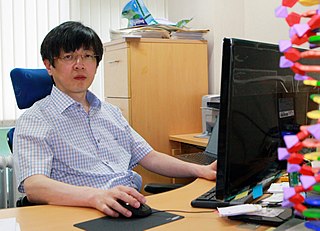
Kim Jin-Soo is a chemist, biologist, and entrepreneur. He was CEO and CSO, ToolGen, Inc., is a professor in the Department of Chemistry of Seoul National University and director of the Center for Genome Engineering. His research team has developed and improved several types of programmable nucleases, specifically zinc finger nucleases (ZFNs), TAL effector nucleases (TALENs), and RNA-guided engineered nucleases (RGENs). In 2018, he was a Clarivate Analytics Highly Cited Researcher in the cross-field category and in the biology and biochemistry category in 2019.
Christopher William Bielawski is a distinguished professor at Ulsan National Institute of Science and Technology and group leader of the Synthesis Group in the Center for Multidimensional Carbon Materials. His research in synthesis and polymer chemistry has resulted in more than 290 publications and multiple patents.
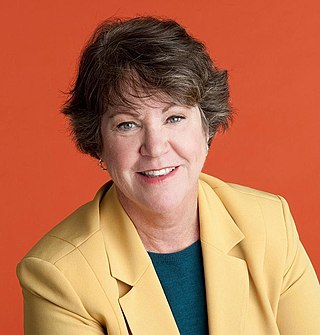
Kathy Lynn Hudson is an American microbiologist specializing in science policy. She was the deputy director for science, outreach, and policy at the National Institutes of Health from October 2010 to January 2017. Hudson assisted in the creation and launch of All of Us, the BRAIN initiative, and the National Center for Advancing Translational Sciences. She founded the Genetics and Public Policy Center at Johns Hopkins University in 2002. Hudson is an advocate for women in science.

Suh Pann-Ghill is a South Korean neuroscientist. He has served as a professor and vice president for research at UNIST and the third president of the Korea Brain Research Institute.
















